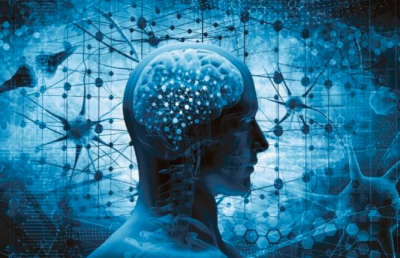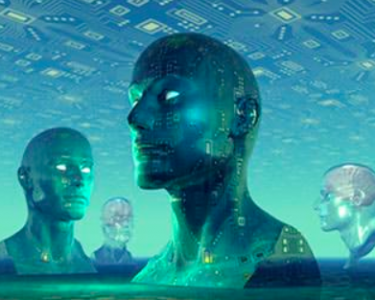 aNewDomain — Technologically, at least, I’m an optimist.
aNewDomain — Technologically, at least, I’m an optimist.
As I see it, advanced technologies are already beginning to pave the way for a likely humanistic and transhumanistic future. Skeptics will shake their heads, but I think the time will come when we’ll not only create superhuman thinking machines, but even merge with them to explore incredible new forms of mind, society, embodiments and experience.
Along the way, we’re likely to cmeaure most disease, even death.
But things can go wrong. And if they go wrong enough, the whole transhumanist vision we’ve worked so hard to bring about will never happen.
But what if we could imagine the sorts of things that could transhumanism before it gets here and take steps now to prevent them? It’s worth a shot, I thought, so I got down to thinking.
Before we start describing all the disastrous events that could get in the way here, let’s look at what makes this vision of our future seem so inevitable. It isn’t just that technology is involved — or just that it’s so advanced. It’s that the fundamental forces and motivations driving it forward are the same ones that drive us forward.
One of those is agency. The ability and freedom to decide our own course in life is one of the big ones.Nearly all of us wants to be able to make our own choices about key aspects of our lives; and we wish the same for our families, friends and communities.
Another one is growth. From birth, we humans seem driven to grow up and out of where we originate, to take on new challenges and ways of being. We want that for ourselves, and most of us what that for others, too. It’s inately and recognizably human, this impulse. .
And then there’s this one, too often discounted, which is a sense of joy. Joyfulness. We all experience joy, and most of crave that feeling. We even derive joy from watching others experience it.
Now think about computer networking, AI, biotech, nanotech, blockchain and robotics, for instance. More than any tech that came beofre them, these rely and draw on such universal impulses. Like us, they thrive our urges for joy, for agency, for growth and creativity.
No wonder it sometimes feels like we’re all on one inevitable, inexorable collision course. Like it or not, I’ve heard it said, the transhumanism future is heading our way.
But a lot can happen between here and the singularity, and some of the possibilities are downright disturbing. A natural disaster, say a small comet, could destroy the Earth, or most of it, and our fanciest technologies along with it. Human-encouraged natural catastrophes like global warming or fracking-indusced earthquakes are even more likely. And then there’s war. One big one — not even a full scale World War III — could end our transhumanism hopes by ending, well, humanism.
In his 2013 book Superintelligence, Nick Bostrom adds another doomsday scenario, a whole category unto it self. And that’s where superhuman AIs could well decide that the molecules we’re made of would be far better spent for some other, perhaps more pleasing, use or purpose. In fact, they’re even likely to.
But all these threats pale, in my view, to the one I fear most — because it seems to me to be by far the most likely. Where scores of disaffected people, shut out of the centers of the world economy via radical economic inequality or political restrictions, will angrily leverage advanced technology to cause massive destruction. That in turn creates a chaotic political situation world-wide, in towhich all sorts of destructive technologies may be born (including maybe the ones Bostrom worries about!).
What to do? Well, we have to start thinking about how to save the world, of course. But to come up with that plan, we have to first see what we’re dealing with. Allowing for some decent-sized logical leaps, here’s how I can see it shaping up in the worst cases and what we might do to mitigate those risks.
The Congo Effect
First, let’s suppose that AI and robotics and associated technologies keep on advancing impressively, so that the need for human labor in the economy keeps on decreasing.
Well, then what happens to the people whose efforts are no longer needed in the labor force?
In the developed world, we already see a strong movement toward universal basic income, which is pretty much the only rational and compassionate solution to the situation. But what about the developing world? Who will give universal basic income to the citizens of, say, the Congo or Central African Republic, when the developed-world economy has advanced sufficiently that outsourcing to the citizens of these nations doesn’t make any economic sense?
One possibility is that developed-world philanthropists or governments rise to the occasion and distribute universal basic income throughout the world. But I don’t have much faith this will happen.
One issue is that even the wealthiest philanthropists don’t have the funds to make a huge difference. Suppose Bill Gates gave half his wealth to supply Africa with universal basic income. 30 billion dollars would give 30 dollars to each African for one year. This is just not enough. No small set of good-hearted individuals is wealthy enough to make a real dent here. The whole class of super-wealthy individuals is rich enough to make a dent, but few of them care as much as the celebrated handful of billionaire philanthropists like Gates, Zuckerberg and Buffett.
UBI Populism
Another issue is that, in developed democracies like the US, average voters are typically very unhappy with foreign aid. Average Americans vastly overestimate the amount of foreign aid that the US government currently gives out, and they tend not to like it.
As soon as the US government first begins giving out universal basic income, there will be people who just aren’t happy about it. There will be masses of voters who won’t want to diminish even a bit of their monthly payments in order to help faraway people with strange cultures and belief systems.
It could happen that, due to advancing technology, supplying basic needs becomes so cheap that it becomes politically unproblematic to supply a universal basic income globally.
That might be the case if, for instance, we had a sudden breakthrough in molecular nanotechnology leading to fairly general-purpose, low-cost molecular assemblers. Such an outcome would awesome, to be sure.
It could happen, too, but I’m not counting on it.
Undoubtedly, the advanced new technologies that will refigure our world will arrive sooner or later. But if history is any guide, they’ll arrive a few years or even a decade or two after the technology enabling them does.
That could leave developing-world citizens economically stranded and seething, which could have the effect of trashing everything we’ve worked for before it even begins.
Meanwhile, back in the Sahara …
I realize that, for folks who live in developed nations, it can be hard to identify with or even egin to empathize with the what the worst off peopulations have to deal with as a. matter of course. I’ve gotten a little bit of insight into this because I take frequent visits to Ethiopia, where I’ve been co-running an AI and robotics outsourcing shop since for five years now. But even so, I have to admit I still don’t have a full feel for these things, and certainly nothing akin to what someone who grew up there would experience..
Say you live in sub-Saharan Africa. Odds are that even if you could afford a smartphone, you couldn’t afford a lot of data minutes. Unrestricted viewing of, say, educational videos or news updates just isn’t an option available to you.
Similarly, university tuition will be a real reach for you, too. And if you’re a woman, that reach takes on galactic proportions. In the right environment, you might do really well on exams at the end of high school and have a good chance getting that higher education. Butt if time, circumstances or bad luck force you to miss that one opportunity, that’s it. You’re chance is probably blown for life.
But say you get that education. After graduation, you might want to start a business. But saving a couple thousand US dollars for seed funding could prove to be an almost impossible task. .As soon as you save a few hundred dollars, odds are fairly high that somethingor someone will occur that separates you from that cash, and for the best of reasons. Maybe you have to rebuild your home after a fire or flood. Or maybe you have a relative in a remote village who needs to pay for critical medical care.
Your choice may be to spend your savings to help your great-aunt, else be responsible for her death.
But say you dodge that eventuality. You start your business, and now you want to use your hard-won savings to fly to some foreign tech hub to show your prototype to some investors?
Good luck getting a visa. It’s possible, sure, but it’s extremely chancy.
I have had many failures trying to bring my Ethiopian AI researcher colleagues to Hong Kong, Canada and the US on temporary visitor visas or work visas. These are people with advanced degrees in science and technology and serious work histories in AI software development. But more than once, I’ve seen immigration departments reject the applications with no reason given.
But what if you’ve managed to buck the odds and scramble like hell to gain the needed skills? Well, aybe you can work online for overseas customers, doing consulting and saving money for your future that way.
Well, except the e-work websites may well not be set up to allow you to register any payment method available to you on their sites.
If you do manage to register, you’ll get paid 1/10 the amount of folks in the developed world for doing exactly the same work, because of the country of residence indicated on your profile on the site.
And oh, then you may find that your country’s government decides to shut down the Internet for a week or two here or there (as I write this, Ethiopia has just shut down its whole country’s internet for a week to try to avoid high school students cheating on their final exams. And they don’t seem to care what this will make your international customers think of your reliability!
It’s incredible, considering all this, but some folks in the developing world do manage to fight through all these factors and achieve great or even modest success.
Many more do not, despite having plenty of smarts and despite putting in much more effort than the average, reasonably successful American, European or Chinese.
Never enough
The situation in, say, the former Soviet republics or the less well-off countries in Southeast Asia or South America is not as extreme as in sub-Saharan Africa. But for many people it is qualitatively the same.
Why do you think there are so many Filipino women willing to leave their spouses and children to work as domestic helpers in Hong Kong for US$600/month, half of which they’ll send home to their families?
Why do you think there are so many attractive, college-educated young Eastern European women, willing to sell themselves as mail-order brides or, worse, escorts and hookers to dull, horny middle-aged men in the US or Western Europe?
Differential enemies
Look. What’s at issue here is not economic equality per se — almost nobody I know is upset that some people are richer than others. There are differentials in ability and willingness to work that naturally lead to differences in wealth and income, at the current state of technological development.
And almost nobody wants to wipe out all the impact of history on wealth — nearly everyone wants to be able to pass along some of what they create or earn during their lives to their children, for example. What’s at issue here is the ability to participate in a reasonably full way in the world economy.
Those developing-world citizens I know who are discontented with their role in the world economy — and by this I. count nearly all of them — are not discontented because they have to compete. And it isn’t just sour grapes, either.
They are discontented because they realize that, by dint of the nations they happen to have been born in, they are disqualified from playing before they even have a chance to get into the game. They know they’ll endure great personal and family sacrifices just to get on the playing field of the international tech economy. And even if they make it that far, their odds of successfully getting past that point are depressingly slim.
Sure, life can be tough all around. Even the super-wealthy can find life a struggle each day, as newspaper tabloids amply document.
I was raised middle class, nowhere near wealthy, and I’ve had to work hard througout my adult life, navigating all sorts of surprise and sometimes, surprisingly traumatic, ups and downs — personally and professionally.
I’m pretty contented now and, even, grateful for both the situation I was born into and the ones I made for myself or chanced into along the way. But I’m lucky.
I’ve lived to see close friends of the same background I grew up in lose all hope. Unfairly stacked competition and stultifying bureaucracies kept them from realizing their dreams and, hopes dashed, they chose to end their lives rather than to soldier on.
Human psyche and human culture involve suffering everywhere on the planet. And in some ways, it has seemed to me that my friends who grew up in meaner straits in the developing world had better, more satisfying lives than my wealthier, luckier, first world friends — just due to the rich and warm social fabric they so often weave around them.
Complexities abound in nearly all human situations. But none of these complexities takes away the prevalence, unfairness or danger of the gross inequity in the current world situation.
Catastophic odds
So yes, radical inequality of opportunity is prevalent and it sucks.
Now take the next step, and realize that: In spite of these factors, there are more and more highly educated young people in the developing world, with understanding of advanced technology. Even the poorest nations are now equipped with computers and networks, and with biological lab equipment, and with universities teaching advanced science and engineering.
It’s not hard to see what sorts of risks this situation leads to.
Imagine that global inequalit. Now you have an increasing population of people, souls who are largely shut out of the excitingly advancing global tech economy but with significant access to modern education and technological tools.
 What happens next? It’s not too hard to predict.
What happens next? It’s not too hard to predict.
As technology advances, it takes fewer and fewer people — and with less and less intelligence and know-how –to create more and more destruction. This is true with computer hacking, it’s true with drones and robots, it’s true with biotech, it’s true with fake news creation, and it will soon be true with nanotech.
An ounce of global prevention …
What we need to do, to prevent global wealth inequality and advanced technology from adding up to produce global catastrophe, is increase equitability of opportunity. We need to enable everyone in the world to have the opportunity to really play the modern global economic-social game.
We need to all be in this together, on a basic level, or else, we’re likely to squander our chance to create radical abundance for all via destroying ourselves in a maelstrom of foolishness, selfishness and violence.
I don’t mean to give the impression that the ONLY reason radical global inequality of opportunity is bad, is its strong potential to lead to widespread destruction. According to my own morals, this sort of radical inequality of opportunity is intrinsically a rotten thing, regardless of the risk it poses to global safety.
I favor joy, growth and choice for all sentient beings, inasmuch is possible, and radical global inequality obvious is crappy on all three counts (it badly hurts joy, growth and choice, calculated in total across the globe). I’m just highlighting, in this particular essay, one among the many nasty implications of this sort of inequality: its reasonably high likelihood of fostering a situation in which vast numbers of humans get killed and nasty futuristic technologies get developed in the chaotic aftermath.
Technology is not the whole solution here; this is a human psychology and culture problem as well as a technology problem. But I do believe that appropriate deployment of appropriate technologies can help create a context in which culture is more likely to evolve in a way that mitigates these problems.
The technologies we need?
Well, we need technologies that encourage a democratic global social fabric. Such a fabric in turn will allow people all around the world to connect with each other, to create media of all sorts for sharing with each other and to transact economically and emotionally with one other.
As a result, governments and large corporations, with their tendency toward impersonality and inertia , won’t find it practical or desirable to clog up the works. And without them or someone else in place to prohibit or pervert exchanges between individuals and the formation of ad hoc or persistent social networks of various sizes and types, ideas and opportunities can grow and flow.
Fortunately, these objectives can viably be achieved by a menu of technologies already in development to various extents.
The following would be a good start:
- Mesh networks, so that Internet access is outside the control of large corporations and governments, and in more direct control of the people
- Decentralized production of low-cost hardware. When we can 3D print the smartphones that enable the mesh network, in relatively low-cost local factories, then we’ll be in a pretty exciting position.
- Machine translation, for both text and voice, that handles all the world’s languages. This is an area where my own research on artificial general intelligence may have a transformative role to play.
- A social-network infrastructure that is widely used, that leverages machine translation and mesh networks, and that is out of the control of governments and corporations.
- A decentralized, peer-to-peer economic exchange mechanism that is widely used and understood, operating on the mesh and requiring only prevalent low-cost hardware. Blockchain technologies provide an obvious basis here, including the new tech and ideas my friends at the Economic Space Agency are working on.
- Videos, games, augmented reality, virtual reality, biofeedback, neurofeedback and AI interaction systems that are oriented toward helping people understand themselves and each other better.
Look. We need meaningful media that will help people grow, and we need it to help them come together, too. Media is absolutely critical in helping societies come together to find common, mutually beneficial solutions to the problems they share. Media and the conversations it enables functino at their root as a means of finding like minds among groups of humans and using that likeness to build communities.
And it’s that community that feeds love and cooperation, while at once discouraging greed, emity and hate.
We need this media distributed in a democratic and decentralized way rather than via advertising or propaganda dominated media channels.
 If provided with the technology to create and disseminate meaningful media, the people of the world will, in my estimation, most probably do so. Lots of substandard media will crop up, no question.
If provided with the technology to create and disseminate meaningful media, the people of the world will, in my estimation, most probably do so. Lots of substandard media will crop up, no question.
But if media is more strongly separated from the desire of governments to spread propaganda and the desire of corporations to maximize profit, then the more positive and growth-oriented sides of humanity will have more chance to self-organize into powerful new configurations.
Do we need all of the above to avert catastrophe?
Well, not necessarily.
Would the development of all this necessarily avert catastrophe?
Also, not necessarily.
But here’s what is true: The more of this we can get, the more of a global level playing field we’re going to have. And that adds up to more of a sense we’re going to have that we’re all in this together, which, really, is the only ingredient you absolutely need to pull all this off.
But make no mistake: Development and deployment of this set of technologies would constitute a revolution, though not the violent kind. We don’t need to overthrow the world’s governments (though some are bound to get overthrown in the next couple decades anyway) and we don’t need to eliminate all the big corporations.
What we need to do is to build new networks that join people together directly, in parallel to governments and corporations, and ultimately subverting their power and influence.
With the above set of technologies, we would have a medium within which all sorts of new social, economic and cultural network would form. These would not lead to complete economic or social equality, and would not eradicate all the problems of the world.
But they would go a long way toward enabling everyone on the planet to participate fully in the ongoing techno-social revolution. A world dominated by such technologies would be one in which positive new tech would have a higher odds of getting developed — including biotech that heals rather than biotech that kills and especially including AI that loves us rather than AI that repurposes all our molecules.
It’s complicated. But it’s not more complicated than building Google, Baidu, the Internet, self-driving cars, New York or Beijing, or pulling off the Human Genome Project. Humanity can solve very complicated problems, when it focuses even a quite modest subset of its attention.
Think about where we, as a society, are focusing our technology development efforts.
Google and Tesla are great companies, for example. But how ultimately important is more effective online ad placement, and better creation of luxury cars? Why is our economy and society organized so that so many of the best educated brilliant minds on the planet are focusing their attention on such things? Of course, Google’s work on ads is funding its work on life extension (Calico). As for Tesla, it’s at work on luxury cars, products it is funding by its work on better batteries, products that have decidedly broader applications.
In spite of the developed world focusing the majority of its economy on the creation of things that exacerbate inequality and appeal to the more selfish, shallow human emotions, we are still getting amazing and important things done.
It is important not to lose sight of that.
But if you’re always having to build silly, frivolous things for the rich just to get, if you’re lucky, the important things that most of us actually need, you can’t or won’t do enough of the latter.
Which leaves us, at the end of all this, with the one thing that actually could save the world before the inevitable forces of greed, inequality and destruction destroy it first.
That, of course, is for all of us to focus our technologies away from traditional market and consumption needs. Instead, we must focus them and select them based entirely on one Kantian question: Will they contribute to that global good?
Can we do that? Have we ever?
Is assured mutual destruction enough of an impetus to make us try to do it this one, last time?
Don’t ask me. I’m the optimist, here.
For aNewDomain, I’m Ben Goertzel.













